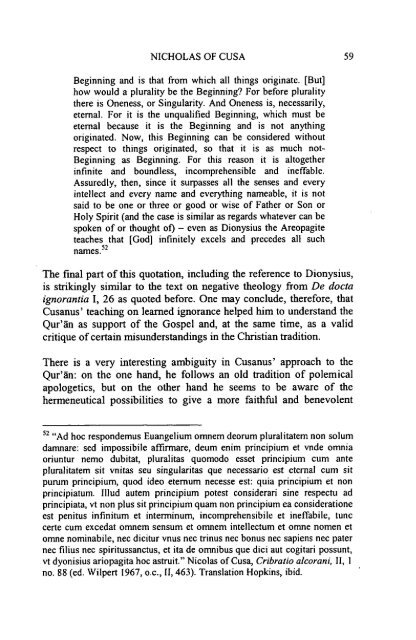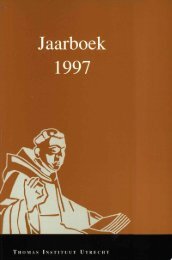Jaarboek Thomas Instituut 2006 - Thomas Instituut te Utrecht
Jaarboek Thomas Instituut 2006 - Thomas Instituut te Utrecht
Jaarboek Thomas Instituut 2006 - Thomas Instituut te Utrecht
You also want an ePaper? Increase the reach of your titles
YUMPU automatically turns print PDFs into web optimized ePapers that Google loves.
NICHOLAS OF CUSA 59<br />
Beginning and is that from which all things origina<strong>te</strong>. [But]<br />
how would a plurality be the Beginning? For before plurality<br />
there is Oneness, or Singularity. And Oneness is, necessarily,<br />
e<strong>te</strong>rnal. For it is the unqualified Beginning, which must be<br />
e<strong>te</strong>rnal because it is the Beginning and is not anything<br />
origina<strong>te</strong>d. Now, this Beginning can be considered without<br />
respect to things origina<strong>te</strong>d, so that it is as much not<br />
Beginning as Beginning. For this reason it is altogether<br />
infini<strong>te</strong> and boundless, incomprehensible and ineffable.<br />
Assuredly, then, since it surpasses all the senses and every<br />
in<strong>te</strong>llect and every name and everything nameable, it is not<br />
said to be one or three or good or wise of Father or Son or<br />
Holy Spirit (and the case is similar as regards wha<strong>te</strong>ver can be<br />
spoken of or thought of) - even as Dionysius the Areopagi<strong>te</strong><br />
<strong>te</strong>aches that [God] infini<strong>te</strong>ly excels and precedes all such<br />
names.52<br />
The fmal part of this quotation, including the reference to Dionysius,<br />
is strikingly similar to the <strong>te</strong>xt on negative theology from De docta<br />
ignorantia I, 26 as quo<strong>te</strong>d before. One may conclude, therefore, that<br />
Cusanus' <strong>te</strong>aching on learned ignorance helped him to understand the<br />
Qur'än as support of the Gospel and, at the same time, as a valid<br />
critique of certain misunderstandings in the Christian tradition.<br />
There is a very in<strong>te</strong>resting ambiguity in Cusanus' approach to the<br />
Qur'än: on the one hand, he follows an old tradition of polemical<br />
apologetics, but on the other hand he seems to be aware of the<br />
hermeneutical possibilities to give a more faithful and benevolent<br />
52 "Ad hoc respondemus Euangelium omnem deorum pluralita<strong>te</strong>m non solum<br />
damnare: sed impossibile aflirmare, deum enim principium et vnde omnia<br />
oriuntur nemo dubitat, pluralitas quomodo esset principium cum an<strong>te</strong><br />
pluralita<strong>te</strong>m sit vnitas seu singularitas que necessario est e<strong>te</strong>rnal cum sit<br />
purum principium, quod ideo e<strong>te</strong>rnum neeesse est: quia principium et non<br />
principiatum. Illud au<strong>te</strong>m principium po<strong>te</strong>st considerari sine respectu ad<br />
principiata, vt non plus sit principium quam non principium ea consideratione<br />
est penitus infinitum et in<strong>te</strong>rminurn, incomprehensibile et ineffabile, tunc<br />
cer<strong>te</strong> cum excedat omnem sensum et omnem in<strong>te</strong>llecturn et omne nomen et<br />
omne nominabile, nee dicitur vnus nee trinus nee bonus nee sapiens nee pa<strong>te</strong>r<br />
nee filius nee spiritussanctus, et ita de omnibus que dici aut eogitari possunt,<br />
vt dyonisius ariopagita hoc astruit." Nicolas ofCusa, Cribratio alcorani, II, I<br />
no. 88 (ed. Wilpert 1967, o.c., II, 463). Translation Hopkins, ibid.








